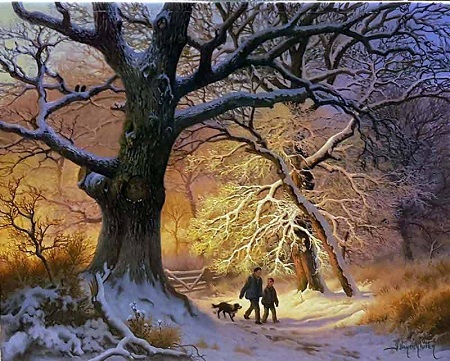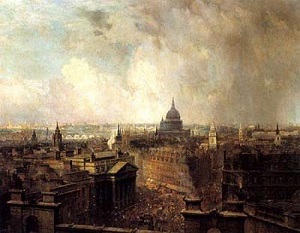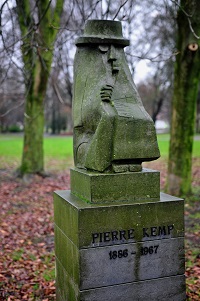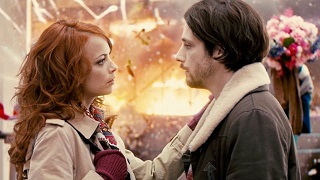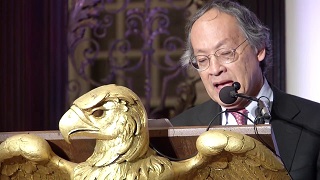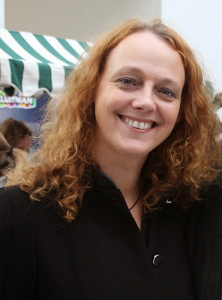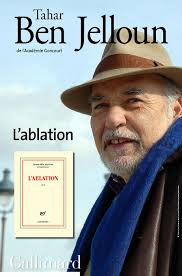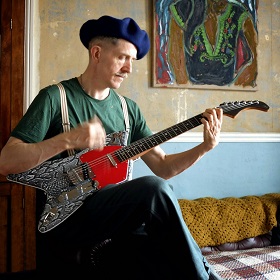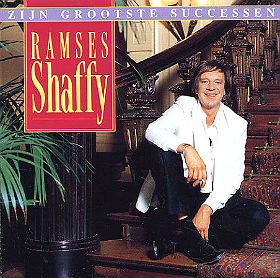De Duitse dichter en schrijver Ernst Toller werd geboren op 1 december 1893 in Samotschin (tegenwoordig Szamocin). Zie ook alle tags voor Ernst Toller op dit blog.
Uit: Hoppla, wir leben!
„Wilhelm Kilman. Wenn nicht …
Karl Thomas. Tot so oder so … Du, Albert marschierst Parademarsch, sechs Schritt hin und her, immer vom Fenster auf die Tür zu. Dann wird das Ochsenauge verdeckt für Sekunden, und dem draußen fällt’s nicht auf. Beim fünften Male springe ich ans Fenster, brech’ mit aller Kraft die Eisen los, und dann ade, Gevatter.
Eva Berg. Ich schrei«! Karl, ich küss’ dich tot.
Albert Kroll. Später.
Karl Thomas. Laß sie doch. Sie ist so jung.
Albert Kroll. Erst springt Karl ‘raus, als zweite Eva, dann packt Wilhelm Mutter Meller, schiebt sie hoch …
Wilhelm Kilman. Ja, ja … ich meine nur …
Frau Meller. Laß ihn zuerst… Mir braucht keiner zu helfen. Ich nehm’ es mit euch allen auf.
Albert Kroll. Maul nicht. Du kommst zuerst, dann Wilhelm, als letzter ich.
Wilhelm Kilman. Wenn die Flucht nicht gelingt. Wir sollten besser überlegen.
Albert Kroll. Wenn die Flucht nicht gelingt…
Karl Thomas. Weiß man je, ob Flucht gelingt? Wagen muß man, Genosse! Ein Revolutionär, der nicht wagt! Hättest bei Mutter Kaffee trinken sollen und nicht auf die Barrikaden gehen.
Wilhelm Kilman. Nachher wären wir alle verloren. Keine Hoffnung gäb’s mehr.
Karl Thomas. Hoffnung, zum Teufel! Auf was Hoffnung? Das Todesurteil ist gefällt. Seit zehn Tagen warten wir auf die Vollstreckung.
Frau Meller. Gestern abend haben sie nach den Adressen unserer Verwandten gefragt.
Karl Thomas. Auf was also Hoffnung? Eine Salve und, wenn sie schlecht trifft, als Zugabe den Fangschuß. Guter Sieg oder guter Tod – seit Jahrtausenden hat die Losung nicht gewechselt. Wilhelm Kilman duckt sich.) Oder… hast du um Gnade gewinselt? Dann schwör wenigstens, daß du schweigen wirst.
Wilhelm Kilman. Warum laßt ihr zu, daß er mich beleidigt? Hab’ ich nicht geschuftet Tag und Nacht? Seit fünfzehn Jahren schinde ich mich für die Partei, und heut muß ich mir sagen lassen… Mir wurde das Frühstück nicht am Bett serviert.”
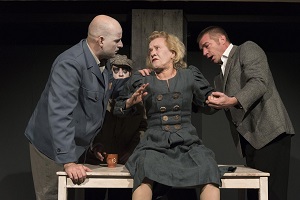
Ernst Toller (1 december 1893 – 22 mei 1939)
Scene uit een opvoering in Riedstadt, 2017
De Hongaarse dichter Mihály Vörösmarty werd geboren op 1 december 1800 in Puszta-Nyék. Zie ook alle tags voor Mihály Vörösmarty op dit blog.
The Call Of The Fatherland (Fragment)
Unto thy fatherland with dauntless heart
Be loyal, oh, Hungarian, for the soil
That was thy cradle will thy grave yet be,
The source and sum of all thy love and toil.
Beyond our frontiers is for thee no home,
Whether thy fate be happy or unblest,
Here only with thy strivings canst thou come,
Here only when thy woes are over, rest.
This earth thy sires have stained with noble blood,
And sanctified by deeds of splendid fame;
Throughout a thousand years hath brightly stood
The memory of their triumph and their name.
‘Twas here heroic Árpád and his horde
Fought for the fatherland, and it was here
That brave Hunyadi drew his conquering sword
And freed us from the yoke of many a year.
Oh, liberty, here have thy banners flown,
And here beneath their reddened folds have died
Our best and bravest – here the hero’s crown
Hath rimmed the forehead flushed with noble pride.
Amid disasters, after weary strife,
Diminished but not crushed, the nation clings
To the dear land that gave its fathers life,
And was the cradle of heroic kings.
Unto the home of all the nations, we,
Unto the world, unto creation, cry –
‘A thousand years of patient hope must be
Pregnant with fate – are we to live or die?’
Vertaald door Nora de Vallyi en Dorothy M. Stuart
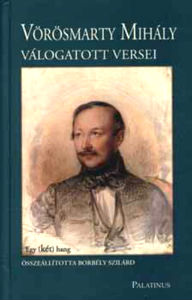
Mihály Vörösmarty (1 december 1800 – 19 november 1855)
Cover
De Russische dichter en schrijver Valery Bryusov werd geboren op 1 december 1873 in Moskou. Zie ook alle tags voor Valery Bryusov op dit blog.
The sea — in a peace
The sea — in a peace, long and lethal —
The movement — as if vaporized.
The sea — as if, made from cast metal,
A mirror of purified skies.
The stones, in hardness of doze,
The shores, by repose enslaved, —
Dream of the daring and joyous,
Honey and sour wave.
Security
1898
Just a few names reach us from the kingdom of Chronos —
From the previous worlds — from the centuries that passed;
Like the Altair’s beam, like a star, these few souls
Through the darkness of times shine forever to us.
And they pass by, they pass by, they pass by — the years,
Endless centuries of being — like waves or like shades.
How many intentions, thoughts and hopes, and tears!
Many millions I, which are vanished and dead!
And for me Homer is just a singer alone,
And the bright Altair is alone in skies…
But in dreams I see often the sphere unknown,
And the word, that is perishing near bright stars.
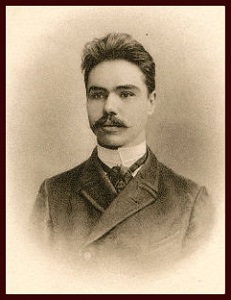
Valery Bryusov (1 december 1873 – 9 oktober 1924)
Als 26-jarige in 1899
De Amerikaanse schrijver Rex Stout werd geboren op 1 december 1886 in Noblesville, Indiana. Zie ook alle tags voor Rex Stout op dit blog.
Uit: The Hand in the Glove
“It was not surprising that Sylvia Raffray, on that Saturday in September, had occasion for discourse with various men, none of them utterly ordinary, and with one remarkable young woman; it was not surprising that all this happened without any special effort on Sylvia’s part, for she was rich, personable to an extreme, an orphan, and six months short of twenty-one years. She was intellectually unpretentious but not vapid; physically a fair focus for dreams but not a gasper—though a viscount stale from Oxford and dubbed her so; financially impregnable but not notorious.
As, around ten o’clock Saturday morning, she emerged from an elevator on the 28th floor of the Chemicals Building on 39th Street, her pretty lips were askew in a crooked line of worrisome determination and her lovely brown eyes were dark with trouble. But surely not a trouble that threatened her soul, for obviously she had not been losing any sleep; and, as she turned right and started down the wide corridor, there was no drag at all in the muscles of her happy young legs.
Twenty feet from the elevator door she stopped short. Facing her was a man who, meeting her from the opposite direction, had also stopped.
Sylvia showed surprise. “Well, hullo! I didn’t know you ever got as far south as this.” She looked down the corridor and back at him. “I suppose you’re buying aspirin wholesale?”
The man stammered, “Miss Raffray. Really.” He too looked along the corridor and back. “They don’t make aspirin, do they?”
She shook her head. “I guess not. I saw you come out of there. Not that it’s any of my business—but I didn’t know they had begun making chemicals out of brains.” She looked doubtful. “I don’t suppose that’s funny, either. Anyhow, nice to see you.” She took a step.
He put out a restraining hand, but without reaching her. He said somewhat loudly, “Miss Raffray!” in a tone of urgency and appeal. She halted, surprised again, and turned the brown eyes back to him. Always pale, he seemed a shade paler, now that she really looked at him. She saw that his stringy hair, objectionably thin for a man not yet forty, was as usual straggling on his forehead, that his large nostrils were faintly quivering from his perpetual mental excitement, which was also definitely objectionable, and that his pale inquisitive eyes appeared, even more than ordinarily, to emerge perceptibly from their sockets in the effort to see more, see deeper, see everything. None of this surprised her, but his tone did, and his hand reaching for her. She raised her brows at him.”
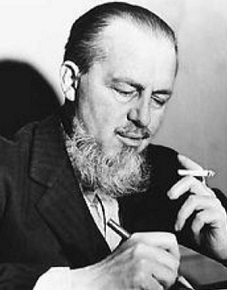
Rex Stout (1 december 1886 – 27 oktober 1975)
De Britse schrijver Henry Williamson werd geboren op 1 december 1895 in Londen. Zie ook alle tags voor Henry Williamson op dit blog.
Uit: The Voice of the Corn
The last labourer left the inn and the village slept. The walls of the cottages gleamed white under the dark thatch as the moonlight fell directly upon them. I was alone with the sapling wheat and all was still.
I was alone with the wheat that I loved. Moving over the field my feet were drenched in an instant by the dew. Lying at full length on the earth, I pressed my face among the sweet wistfulness of stalks, stained and glowing as with some lambent fire, pale, mysterious. On each pale flame-blade depended a small white light, a dew-drop in which the light of the moon was imprisoned. Each flag of wheat held the beauty of pure water, and within the sappy blades glowed the spirit of the earth in the spectral silence a voice spoke of its ancient lineage: of the slow horses that had strained to the wooden plough through the ages, scarring the glebe in long furrows that must be sown with corn; race after race of slow horses moving in jangling harness to the deep shouts of the heavy men. Generation after generation of men, bent with age and unceasing labour, plodding the earth, sowing the yellow grains that would produce a million million berries for mankind. Spring after spring, each with its glory of blue-winged swallows speeding, wheeling, falling through the azure, the cuckoo calling in the meadows and the lark-song shaking its silver earth chain as it strove to be free. Through all the sowings and the reapings for thousands of years the wheat had known that it was grown for man, and the soul of the wheat grew in the knowledge of its service. Lying there on the cool couch of the silver-flotten corn, with the soft earth under me, sweet with its scent of stored sunbeams, the beauty of the phantom wheat carried me away in a passion of sweet ecstasy. Faint as the sea-murmur within the shell, the voice of the corn came to the inward ear. Ever the same was the earth that it knew, the east washed with faint rosewater in the dayspring, the lark-flight loosened upon the bosom of the dawn wind, and the golden beams of the sun breasting the hills of the morning. It was but a moment since the wild men had goaded the sullen oxen, and with rude implements torn a living from the earth; all the great power of the wheat rested above the growing corn now, of kin to the grains beaten by oxen, and later, by the flails of the wretches who were ever hungry.”
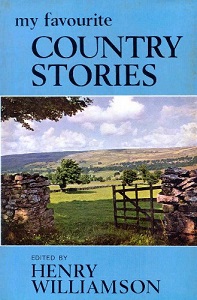
Henry Williamson (1 december 1895 – 13 augustus 1977)
Cover
